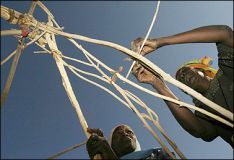Sudan’s new gov’t to resolve rebellions in west, east
KHARTOUM, July 2, 2005 (Xinhua) — The Sudanese government of national unity, to be formed next week, will be tasked with ending the two separate rebellions in western and eastern parts of Africa ‘s largest nation, officials disclosed here Saturday.

|
|
Displaced Sudanese women build a makeshift tut in Otash camp on the outskirts of Nyala town in Sudan’s South Darfur region. (AFP). |
Mohammad Dirdeiry and Yasir Arman, key members of the National Constitutional Revision Commission (NCRC) which drafted an interim constitution told a news conference in Khartoum that the priority of the new government of national unity would be to ensure that there is stability in the entire Sudan.
“The priority of the new government of national unity would be ending conflicts in Darfur region in western Sudan and eastern parts of the country,” Dirdeiry who led the government delegation to NCRC told reporters.
Yasir Arman, who is spokesman of rebel Sudan People’s Liberation Movement/Army (SPLM/A) in south, said both President Omar al-Bashir and southern rebel leader, John Garang who next week would become Sudan’s first vice president, would engage the rebels from Darfur and eastern Sudan into negotiations to find a political solution to the two conflicts.
“The peace agreement was not about north and south. The interim constitution was drafted on the basis of the peace agreement and we expect it to address the problems our people have been fighting for many decades,” he said.
Both the eastern and western groups claim their regions are being marginalized by the Khartoum government, which in turn accuses Eritrea of providing military support to the rebels, a charge that Asmara denies vehemently.
Arman said his movement was ready to enter into the African Union-brokered negotiations to find solutions to problems in Darfur if requested by the rebels and Khartoum government.
He called on the opposition parties to participate in the talks of rebuilding the country, noting that it was only through dialogue that solution can be found to the current differences.
But Dirdeiry ruled out co-opting the recently released prominent Hassan al-Turabi who has criticized the interim constitution.
“We will not co-opt Turabi because most of the political players including those in the National Democratic Alliance have recognized the interim constitution. Those not satisfied can wait for the elections after four years,” Dirdeiry said.
The peace agreement, he added, provided a fair framework for equitable governance, which would lead to the reconstitution and devolution of power in Sudan.
A transition period of six years — after which south Sudan’s people would decide in a referendum whether or not to break away from the rest of Sudan — was also set out in the agreement.
